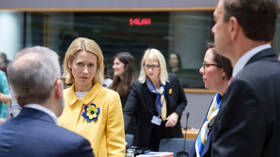First Brexit, then… CorExit? EU’s mild response to coronavirus epidemic could be the final nail in the coffin for European unity

Rising tensions between member states of the EU, brought about by different approaches to dealing with the outbreak of Covid-19, could see the emergence of a new and particularly unwelcome problem for the bloc – CorExit.
While EU Crisis Management Commissioner Janez Lenarcic said Brussels was working on a regional approach to the crisis, the latest figures show more than 10,000 cases of coronavirus in Italy, nearly 2,000 each in France, Germany and Spain, and hundreds across the rest of the continent. With those numbers only ever likely to go higher, that “regional approach” needs to appear pretty darn quickly – like, yesterday.
In a clear sign of division among the EU members, German Chancellor Angela Merkel’s comment that up to 70 percent of the population is likely to be hit by coronavirus didn’t go down well with Czech Republic Prime Minister Andrej Babis, who accused her of making remarks that would simply cause panic.
Also on rt.com Merkel is stirring up panic by warning that up to 70% of Germans could contract Covid-19 – Czech PM BabisMeanwhile, the UK response has won much support across Britain: keep calm and wash your hands. Chief Medical Officer Chris Whitty is a cool-headed boffin who has the nation convinced he knows what he’s talking about. That is how to run an epidemic: put the scientists in charge and give them all the political heft they need to make things better.
If only Britain could convince its fellow EU members… oh, no, wait, that won’t happen.
So it was only yesterday that we saw the big EU initiative on tackling Covid-19 announced: daily video conferences between Europe’s health ministers.
That haphazard, low-level response means that each EU country, insistent on protecting its own people, must be getting on top of the crisis now – and if that means upsetting Brussels and its plans or causing friction with other countries, then so be it.
Brexit has left the UK free to formulate its own battle plan, and don’t think that has gone unnoticed in Paris, Vienna, Rome and Berlin.
Down the road, these rifts that are appearing between EU member states could have a significant impact, particularly if more people die from the coronavirus and those who survive start looking for someone to blame.
“Where were you when our people were dropping dead? Arguing over stocks of paper face masks?” These are not questions any of Europe’s leaders want to be forced to answer.
One of the most visible signs of the epidemic has been that face mask, which continues to cause divisions among European nations as demand is far outstripping supply.
While Europe’s health ministers are all talking about a united response, that hasn’t prevented some of them taking unilateral actions, and damn the collective.
Italy and Germany have banned the sale of masks outside their borders without specific high-level approval, and in France the authorities have seized all available stocks and decreed that they can only be allocated with a doctor’s prescription.
The Czech Republic has asked that all local production of the masks be kept for domestic use.
This approach has already caused a squabble with Belgium, the Netherlands, Lithuania, Estonia and Austria, who insist that export bans on protective equipment should be forbidden in the face of an epidemic such as this.
This apparent show of unity hasn’t stopped Austria, or Slovenia, from taking some unilateral action of their own and imposing tight restrictions at their Italian borders. Despite criticism from some quarters, like France’s President Macron, there is nothing anyone can do to make them reverse that decision.
Also on rt.com Is it really caring? Pope Francis tells clergy to go to sick people, defying Italy’s coronavirus lockdownFear not: the European Commission has announced that it intends to take stock of protective gear and medical equipment in an attempt to co-ordinate distribution around the bloc.
Germany is having none of that, and is sticking with its Plan A of organizing its own response – and you’d better keep your hands off their face masks.
So the cracks in solidarity start to widen.
But what politician in a country such as Italy, in full lock-down and with the population on edge, would suggest reducing the effectiveness of measures being used in their home country, in order to tackle the problem elsewhere? The same goes for neighboring Germany, Switzerland (nearly 500 cases) and France.
The EU certainly treasures collective responses to the problems it faces, but it’s a very hard sell to the 500 million people they are supposed to represent – particularly when family, friends and neighbors are dying from this killer virus and no immediate cure is in sight.
As the squabbles continue, as the number of deaths increase and the people of Europe look to their leaders for help, it is unlikely that the big answers will be coming from Brussels. The national governments are expected by their people to identify and coordinate a response to the epidemic.
And if other countries within the EU have an issue with that, then maybe that’s a fundamental problem with the bloc that will be recognized by some of its more skeptical members as something that needs further consideration.
The EU has already lost one member; could this virus be enough to trigger CorExit?
Like this story? Share it with a friend!
The statements, views and opinions expressed in this column are solely those of the author and do not necessarily represent those of RT.















